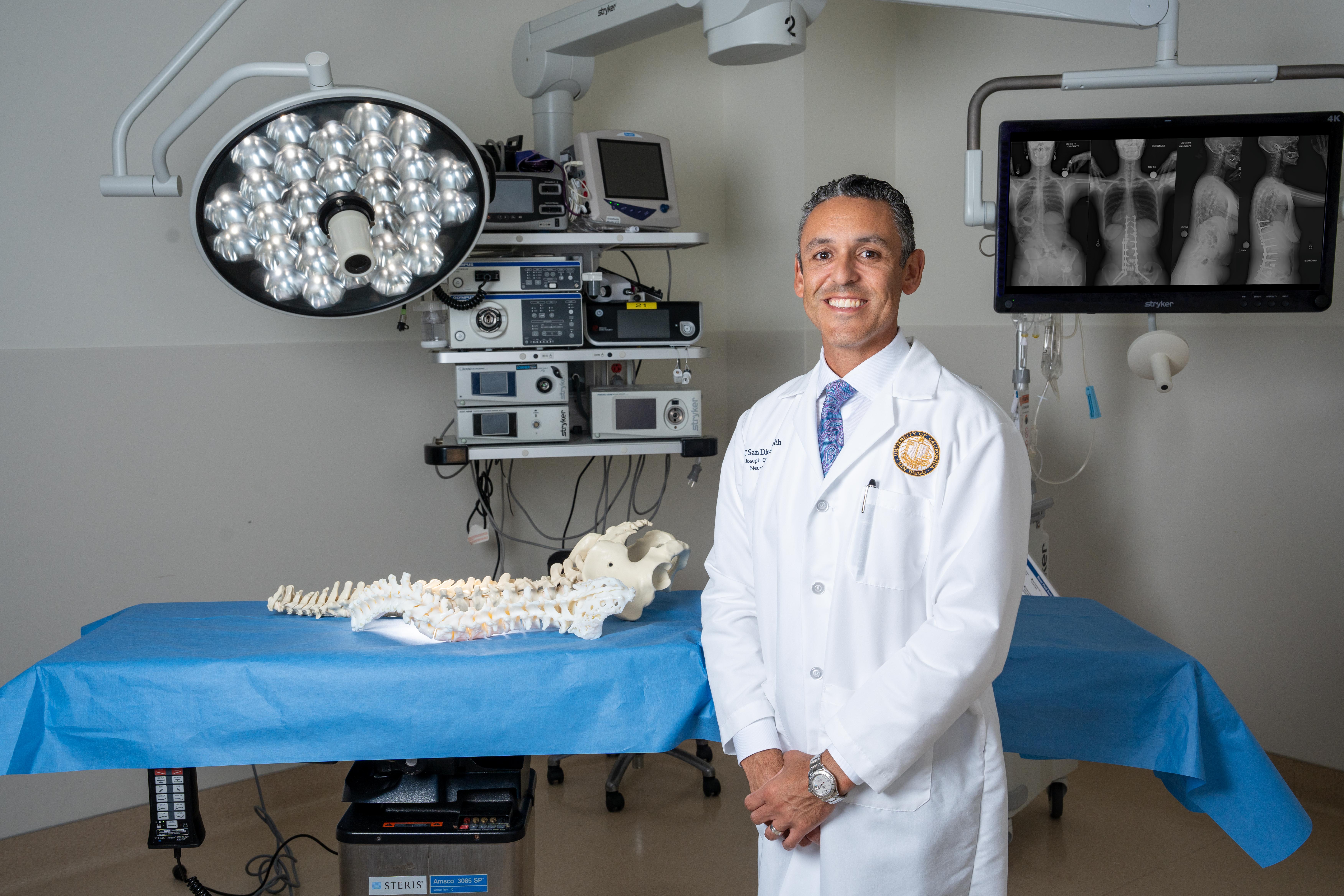
Dr. Joseph Osorio shares more about his Hispanic heritage, why it’s important to share a cultural background with your patients and his advice for Hispanic medical students
Meet Neurosurgeon Dr. Joseph Osorio
Each year National Hispanic Heritage Month, held Sept. 15-Oct. 15, offers an important opportunity to celebrate Hispanic culture and honor the numerous contributions of Hispanic Americans to our society. The vital role of Hispanic Americans is especially visible in healthcare, where a growing number of studies suggest that patients treated by providers who share their ethnicity may experience better outcomes.
To celebrate National Hispanic Heritage Month, we connected with neurosurgeon Joseph Osorio, MD, PhD, assistant professor of neurological surgery and director of spinal oncology and deformity surgery at UC San Diego Health. Learn more about his Hispanic heritage, why it’s important to share a cultural background with your patients and his advice for Hispanic medical students who are interested in neurosurgery in the Q&A below.
Interviewing Dr. Osorio
Tell us more about your Hispanic heritage.
My parents are both immigrants from Colombia. Two of my siblings were born in Colombia and two in the United States; I was born and raised in San Diego. I have extended family that live in Colombia whom we visit about once every other year. They mostly live in Cartagena and Barranquilla, both beautiful areas on the Caribbean coast. My parents are bilingual but mostly speak Spanish, so I've spoken Spanish to them all my life.
What does National Hispanic Heritage Month mean to you?
For me it's a time to really reflect on the Hispanic culture and heritage that surrounds us. Being in California, and in particular San Diego, there is an abundance of Hispanic people living in our community. This month is a time to celebrate and honor that culture. Additionally, as a Spanish-speaking provider, I tend to think about the important role we play in patient care.
Why is it important to share the same cultural background as your patients?
As a spine surgeon who often recommends complex and life-changing procedures, it’s essential to have trust with your patients. If your heritage and language mirrors that of your provider, it allows you to connect on a different, more impactful level. I can tell when a Spanish-speaking patient has an “aha” moment and they realize I understand what they’ve been going through.
There are also times when it's not as simple as asking a patient to tell you their pain level. A number from one to 10 won’t always give a full story. When I’m speaking a patient’s native language I get a better sense of their need for surgery by how they're describing their symptoms.
You'll also often find in the Latin culture that the whole family gets involved, whether it’s a large or small surgery. I'm always very open to having more family members in the room during consultations or speaking to family members by phone who have questions as a way to ensure patients feel as comfortable as possible.
Collectively, these actions combine to result in improved patient care and better outcomes which is ultimately our goal as providers.
What advice do you have for Hispanic medical students who are interested in neurosurgery?
Dr. Joseph Osorio joined the Latino Medical Student Association of UC San Diego at the group’s Café Con Leche event, a quarterly lunch-time talk featuring a LatinX physician sharing their path to medicine.
Mentorship from a provider you can see yourself emulating is crucial. Don’t be afraid to reach out to a neurosurgeon you admire and ask if you can shadow them. It’s also deeply valuable to have the opportunity to see neurosurgery practiced through the lens of a bilingual provider.
Additionally, sometimes in Hispanic culture a great career means you're not only successful, but you can be around your family a lot. My older brother became a liver transplant surgeon, and my parents really didn't understand his career. They saw how busy he was and sort of guided me away from medicine. If you are struggling with a similar situation, I want you to know that it is possible to find a way to do both. I live in my hometown of San Diego and every Sunday we have a big dinner with our entire extended family. So it is possible to do what you love and enjoy time with your family.
When you first joined UC San Diego, you joined the Hispanic Center of Excellence (HCOE) Faculty Development Program. Tell us more about your experience with this program.
The HCOE was a wonderful way to connect with other Hispanic faculty members on campus, especially as a junior faculty member. This network helped further my academic career and offered a safe space where we could talk through our experiences.
Additionally, the group also offers grant opportunities to its members. Our chair Dr. Alexander Khalessi actually nominated me for an HCOE grant that supported the hiring of a clinical research coordinator. This was incredibly valuable support that accelerated my academic research.
You were recently elected to the Executive Committee (EC) of the Congress of Neurological Surgeons (CNS), the leading academic society for neurosurgical professionals. What are your priorities for the year ahead?
I’m honored to be elected to the role and delighted to work alongside our chair Dr. Alexander Khalessi, the current CNS president, and EC member Dr. Sharona Ben-Haim. In the year ahead I’m looking forward to contributing to the organization’s guidelines and bylaws and liaising with the Scoliosis Research Society to form a strong link between the organizations. Overall, I’m looking forward to furthering the CNS’ mission of advancing neurosurgical education, clinical practice and scientific exchange to save lives.
Interested in more stories about Hispanic neurosurgeons? Read about Drs. David Santiago-Dieppa and Alexander Tenorio, who have developed a deep friendship and strong mentoring relationship based on their shared heritage.
